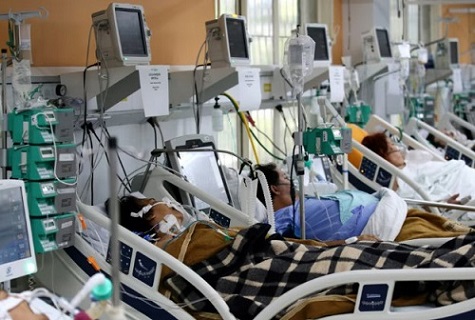Argentina Battles Historic Dengue Outbreak: 103,000 Cases And 79 Deaths In First Ten Weeks of 2024. Healthcare Crisis As Other Diseases Also Soars!
Nikhil Prasad Fact checked by:Thailand Medical News Team Mar 21, 2024 1 year, 10 months, 1 week, 1 day, 23 hours, 19 minutes ago
Dengue News: Argentina is facing an unprecedented dengue outbreak, with the latest data revealing a staggering 103,000 cases and 79 deaths recorded in the first ten weeks of 2024. This surge in dengue cases has not only overwhelmed healthcare facilities but also sparked concerns about the country's ability to effectively manage the crisis. The country is also facing increases in COVID-19, pneumonia and other respiratory infections along with malaria, norovirus, TB, measles and HIV increases.
 Hospitals Overwhelmed As Argentina Battles Historic Dengue Outbreak
Hospitals Overwhelmed As Argentina Battles Historic Dengue Outbreak
Local
Dengue News coverages also reveal that hospitals and clinics across the country are once again overwhelmed with an acute shortage of hospital beds and long waiting queues Emergency Departments of various hospitals.
The situation is no different from that seen in Brazil and Nicaragua and in across many Central and South American countries where there is a major healthcare crisis and hospitals are in the midst of collapsing if not already so.
https://www.thailandmedical.news/news/what-s-happening-nicaragua-pneumonia-cases-hits-more-than-13000-cases-so-far--situation-similar-to-brazil-dengue-covid-19-tb-norovirus-rising
https://www.thailandmedical.news/news/brazil-s-healthcare-doomed-as-covid-19-infections-rise-along-with-dengue-flu-rsv-malaria-zika-measles-tb-hiv-and-cholera-infections
https://www.thailandmedical.news/news/sao-paulo-brazil-records-54-percent-increase-of-covid-19-deaths-and-85-percent-increase-in-infections
Such similar scenes are expected across countries in Europe and elsewhere soon.
The National Epidemiological Bulletin of the Argentinian Ministry of Health has reported a total of 120,007 dengue cases from week 31 of 2023 to week 10 of 2024. Among these cases, 109,313 were classified as indigenous (without travel history), 3,917 as imported, and 6,777 under investigation. The cumulative incidence nationwide stands at a troubling 255 cases per one hundred thousand inhabitants.
https://bancos.salud.gob.ar/recurso/boletin-epidemiologico-nacional-n-695-se-10-2024
Geographic Impact and Temporal Trends
The impact of the outbreak varies across different regions of Argentina. Provinces such as Buenos Aires, Misiones, Chaco, and Corrientes have borne the brunt of the outbreak, reporting the highes
t number of cases and deaths. The fatality rate, currently at 0.07%, underscores the severity of the situation.
Furthermore, the temporal behavior of the outbreak is concerning. The sustained increase in cases since October 2023, surpassing previous seasonal peaks, indicates a worsening trend. The highest number of cases in 2024 was recorded in late February, surpassing the peak observed in the previous year.
Viral Strains and Age Groups Affected
The circulating serotypes of the dengue virus, including DEN-1, DEN-2, and DEN-3, highlight the complexity of the outbreak. Coinfections of serotypes have been detected in specific regions, contributing to the challenge of managing the disease effectively.
While dengue cases have been reported across all age groups, the incidence is notably higher among individuals aged 15 to 64 years. Children under 4 years old have the lowest cumulative incidence, whereas young adults between 25- and 34-years old face the highest risk.
Expert Perspectives and Predictions
Health experts have expressed grave concerns about the current trajectory of the outbreak. Dr Susana Lloveras, an infectious disease specialist, warns that each epidemic outbreak in recent years has surpassed its predecessor, indicating a troubling trend of escalating dengue cases.
Dr Sylvia Fischer, a Conicet researcher, echoes these concerns, noting that the number of cases in 2024 is poised to exceed the previous season's figures. The persistent rise in cases underscores the urgent need for comprehensive intervention measures.
Preventive Measures and Vaccination Advocacy
The Ministry of Health of Argentina has issued preventive recommendations to curb the spread of dengue. These measures include eliminating stagnant water sources, maintaining clean surroundings, and using protective measures such as mosquito netting.
In response to the outbreak, National Senator Maximiliano Abad has called for the inclusion of the dengue vaccine in the National Calendar. Emphasizing the duty of the state to protect vulnerable populations, Abad urges intensified prevention efforts and considerations for declaring an epidemiological emergency.
Regional Context and Global Concerns
The dengue outbreak in Argentina is part of a broader regional trend, with neighboring countries also grappling with rising cases. Brazil, Nicaragua, Chile, Colombia in particular, has witnessed the spread of dengue into previously unaffected regions, highlighting the transnational nature of the disease.
The Pan American Health Organization (PAHO) has issued a warning regarding the increased dengue cases across the region. Last year marked a record high in dengue cases, signaling a pressing need for coordinated regional responses and international support.
Conclusion: Urgent Action Needed
As Argentina faces its largest dengue outbreak in history, urgent action is imperative to mitigate the impact on public health. Comprehensive strategies encompassing surveillance, prevention, and treatment are essential to contain the spread of the virus and prevent further casualties. The inclusion of the dengue vaccine in national vaccination programs and intensified public awareness campaigns are crucial steps in this battle against a relentless epidemic.
Furthermore, the economic ramifications of the outbreak cannot be overlooked. The strain on healthcare resources, including hospitals, medical personnel, and supplies, underscores the need for increased funding and support from both government agencies and international organizations.
Public education and community engagement are also vital components of an effective response. Empowering individuals with knowledge about dengue prevention, symptoms, and treatment can help reduce transmission rates and mitigate the severity of the outbreak.
In conclusion, while the current dengue outbreak in Argentina presents significant challenges, it also serves as a wake-up call for enhanced preparedness and response strategies. By working collaboratively at local, national, and regional levels, Argentina can navigate through this crisis and emerge stronger in the face of future health threats.
For the latest
Dengue News, keep on logging to Thailand Medical News.
